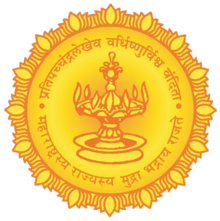Maharashtra Control of Organised Crime Act
Maharashtra Control of Organised Crime Act, 1999 (MCOCA) is a law enacted by Maharashtra state in India in 1999 to combat organised crime and terrorism.[1] The preamble to MCOCA says that "the existing legal framework, i.e. the penal and procedural laws and the adjudicatory system, are found to be rather inadequate to curb or control the menace of organised crime. Government has, therefore, decided to enact a special law with stringent and deterrent provisions including in certain circumstances power to intercept wire, electronic or oral communication to control the menace of organised crime." [2]
| Maharashtra Control of Organised Crime Act | |
|---|---|
 | |
| Maharashtra Legislative Assembly | |
| Enacted by | Maharashtra Legislative Assembly |
| Status: In force | |
Unlike normal law the confessions before senior police officers are admissible, not only against the accused giving the confession but also against the other accused in the same case. There is no provision for granting anticipatory bail for 6 months to the accused.[3]
In 2002 in order to curb the increasing crimes of the organised gangs this law was extended to the National Capital Territory of Delhi by the Union Home Ministry.[3] Ajai Raj Sharma the then Commissioner of Delhi Police told a press conference, "Organised gangs had been trying to gain a foothold in the national capital but their designs had been foiled so far. MCOCA will help in dealing with it more effectively.”[4]
References
- "Special: Lawyer Shrikant Bhat Control of Organised Crime Act". Rediff.com. Retrieved 23 December 2010.
- "Maharashtra Control of Organised Crime Act, 1999". Satp.org. 24 February 1999. Retrieved 24 February 2012.
- "MCOCA extended to Delhi". The Hindu. 8 January 2002. Retrieved 28 July 2012.
- MCOCA extended to Delhi zeenews.india.com | January 7, 2002